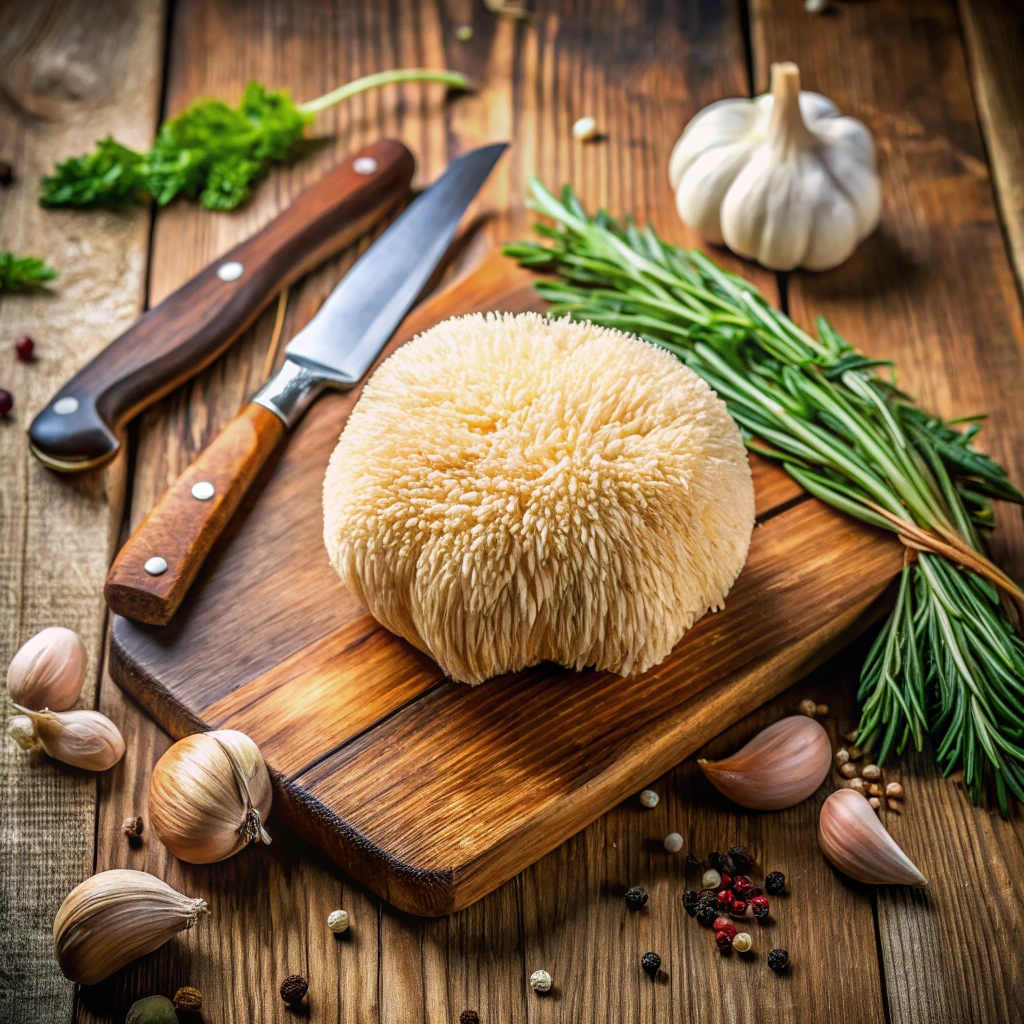Lion’s Mane mushroom (Hericium erinaceus), a functional mushroom known for its shaggy, mane-like appearance, has recently gained attention for its potential health benefits and downsides. Often used in traditional Chinese medicine and modern dietary supplements, it is praised for supporting brain health, immune function, and digestive wellness. However, as with any health product, there are risks to consider. So, what are the downsides and benefits of Lion’s Mane? This article provides a balanced look at the advantages and potential risks associated with this intriguing mushroom.
Lion’s Mane contains bioactive compounds like erinacines and hericenones, which are believed to support cognitive function by stimulating nerve growth factor (NGF). It may also offer benefits for gut health, immunity, and mental well-being. Despite these benefits, some users report mild side effects, and there are questions about its long-term safety. If you’re interested in a comprehensive overview of its properties, check out Lion’s Mane Mushrooms Benefits And Uses.
From its ability to enhance your culinary dishes to its medicinal applications, Lion’s Mane is versatile. Use it in cooking by pairing it with a Sourdough Bagel Recipe or try it as a tea or supplement. While it has promising benefits, such as antioxidant-rich properties, understanding its potential downsides is crucial for safe use. Keep reading to learn how to make the most of Lion’s Mane while avoiding common pitfalls.
What Is Lion’s Mane Mushroom?
Lion’s Mane mushroom (Hericium erinaceus) is a unique and fascinating fungus renowned for its culinary and medicinal uses. Named for its shaggy, mane-like appearance, it is a staple in traditional Chinese medicine and is celebrated for its potential health benefits. This mushroom grows on hardwood trees in North America, Europe, and Asia and has recently gained popularity as a functional food and dietary supplement.
Appearance And Habitat
- Appearance: Lion’s Mane resembles a cascade of white, hair-like spines that give it a distinct and fluffy look.
- Habitat: It typically grows on dead or decaying hardwood trees like oak and beech. It thrives in temperate climates and can also be cultivated commercially.
Nutritional Profile
Lion’s Mane is packed with nutrients and bioactive compounds, making it a nutritious addition to your diet:
- Rich In Protein And Fiber: Helps support a balanced diet and promotes satiety.
- Bioactive Compounds: Contains polysaccharides, erinacines, and hericenones, which are believed to support brain health and overall wellness.
- Low In Calories: Making it suitable for those managing their caloric intake.
Uses In Culinary And Medicine
Lion’s Mane is versatile and can be consumed in various ways:
- Culinary: Its mild, seafood-like flavor makes it a popular ingredient in stir-fries, soups, and sautés. For a creative meal, try pairing it with the Sourdough Bagel Recipe.
- Medicinal: Often used in traditional medicine to support cognitive health, digestion, and immunity.
- Supplements: Available in powders, capsules, and tinctures for those seeking a convenient way to enjoy its benefits.
Lion’s Mane is not just a mushroom—it’s a powerful ally for health and wellness, offering a natural way to support both body and mind. Its increasing popularity as a superfood highlights its versatility and effectiveness in a modern diet.

Benefits Of Lion’s Mane Mushroom
Lion’s Mane mushroom (Hericium erinaceus) is widely recognized for its potential to support overall wellness. Its bioactive compounds, such as erinacines and hericenones, contribute to its extensive range of health benefits, making it a valuable addition to functional diets and supplements.
1. Cognitive Benefits
- Stimulates nerve growth factor (NGF), which may support brain plasticity.
- Shown to improve memory and focus in studies on individuals with mild cognitive impairment.
- Potential to protect against neurological diseases like Alzheimer’s and dementia.
2. Mental Health Support
- May alleviate symptoms of anxiety and depression by regulating mood-related neurotransmitters.
- Helps mitigate the effects of chronic stress.
3. Digestive Health
- Functions as a prebiotic, feeding beneficial gut bacteria.
- May reduce inflammation in the digestive tract, aiding conditions like ulcers.
4. Immune System Boost
- Contains antioxidants that reduce oxidative stress, supporting the body’s natural defenses.
- Anti-inflammatory effects may contribute to overall immune health. Complement it with recipes like Coconut Chia Pudding Recipe to maximize antioxidant intake.
5. Anti-Cancer Properties
- Preliminary research suggests Lion’s Mane may inhibit the growth of certain cancer cells.
- Antioxidants in the mushroom help prevent cellular damage.
6. Heart Health
- May lower cholesterol and triglycerides, promoting cardiovascular health.
- Potentially regulates blood sugar levels, aiding individuals managing diabetes.
For more creative ways to use Lion’s Mane in cooking, try incorporating it into dishes like Alice Springs Chicken Recipe for added nutritional value.
Downsides And Risks Of Lion’s Mane Mushroom
While Lion’s Mane mushroom (Hericium erinaceus) offers numerous health benefits, it is essential to understand its potential downsides and risks. Being aware of these can help you make informed decisions about its use.
1. Allergic Reactions
- Symptoms may include:
- Skin rash.
- Respiratory issues.
- Individuals with mushroom allergies should exercise caution and consult a healthcare provider.
2. Digestive Issues
- Common side effects include:
- Bloating.
- Diarrhea.
- Starting with a low dose can minimize discomfort.
3. Limited Long-Term Research
- Most studies focus on short-term effects, leaving gaps in long-term safety data.
- Overuse could lead to unanticipated issues. Pairing Lion’s Mane with balanced nutrition, like High Protein Overnight Oats Recipe, can support overall health.
4. Medication Interactions
- May interact with:
- Blood-thinning drugs increase bleeding risks.
- Diabetes medications, potentially leading to low blood sugar levels.
- Always consult a healthcare provider before adding it to your routine.
5. Variability In Supplement Quality
- Not all supplements are created equal, and some may lack potency or purity.
- Look for third-party testing and organic certifications to ensure quality.
How To Use Lion’s Mane Safely
Lion’s Mane mushroom offers numerous health benefits, but safe and informed usage is key to maximizing its potential while minimizing risks. Whether you’re a first-time user or looking to refine your regimen, these guidelines will help you incorporate Lion’s Mane effectively into your routine.
1. Start With The Right Dosage
The appropriate dosage depends on your health goals and body’s tolerance:
- For Beginners: Start with 500-1,000 mg per day. This allows your body to adjust to its bioactive compounds, such as erinacines and hericenones.
- For Regular Users: Gradually increase the dose to 1,500-2,000 mg per day, depending on your needs. Always follow the manufacturer’s recommendations on supplements.
- Keep track of your body’s response to adjust the dosage as needed.
2. Choose Your Preferred Form
Lion’s Mane is available in various forms to suit different preferences:
- Powder: Perfect for adding to smoothies, soups, or tea.
- Capsules: Convenient for consistent dosing, ideal for on-the-go use.
- Tinctures: Liquid extracts that offer high bioavailability and are easy to mix into drinks.
- Raw or Cooked: Fresh mushrooms can be sautéed or added to meals. Pair them with recipes like the Sourdough Bagel Recipe for a balanced and flavorful meal.
3. Timing and Frequency
- For optimal effects on cognitive function and energy, take Lion’s Mane in the morning or early afternoon.
- Those using it for sleep support may benefit from consuming it in the evening.
- Consistency is key, so include it into your each day ordinary for quality outcomes.
4. Check For Allergic Reactions
- Start with a small dose and monitor for signs of an allergic reaction, such as rash, itching, or difficulty breathing.
- Discontinue use immediately and consult a healthcare provider if symptoms occur.
5. Buy From Trusted Sources
Quality matters when choosing Lion’s Mane supplements:
For a health-conscious meal pairing, try Lion’s Mane with antioxidant-rich foods like the Coconut Chia Pudding Recipe.Mane with nutritious dishes like Frozen Carrots Recipe Ideas for a hearty meal.
Look for organic, non-GMO products that have been third-party tested for purity.
Avoid brands that use fillers or mycelium (mushroom roots), as these may have lower active compound content.

FAQs
What Does Lion’s Mane Taste Like?
Lion’s Mane has a slight, seafood-like taste, often in comparison to crab or lobster. Its delicate taste makes it versatile for use in stir-fries, soups, and sautés. For a creative meal, pair it with the Sourdough Bagel Recipe for a hearty breakfast or snack.
Can Lion’s Mane Be Consumed Daily?
Yes, Lion’s Mane can be consumed daily, as long as you adhere to recommended doses. Regular use may support cognitive health, digestion, and immunity. For beginners, start with a lower dose and gradually increase as your body adjusts.
Is Lion’s Mane Safe For Everyone?
While generally safe, Lion’s Mane may not be suitable for everyone:
- Individuals with mushroom allergies should avoid it.
- Those taking medications, such as blood thinners or diabetes treatments, should consult a healthcare provider before use.
- Pregnant and breastfeeding women should seek medical advice prior to starting Lion’s Mane.
Does Lion’s Mane Have Psychedelic Effects?
No, Lion’s Mane is not a psychedelic mushroom. It does not cause hallucinations or alter consciousness. Instead, it supports brain health by stimulating nerve growth factor (NGF).
What Are The Long-Term Effects Of Taking Lion’s Mane?
The long-term effects of Lion’s Mane are still being researched, but current studies suggest its safety for extended use. For a well-rounded diet, complement its benefits with foods like the High Protein Overnight Oats Recipe to maintain overall wellness.
Can Lion’s Mane Be Used In Recipes?
Absolutely! Fresh Lion’s Mane can be cooked like any other mushroom. Try sautéing it with olive oil, garlic, and herbs for a simple dish, or include it in more elaborate meals like the Alice Springs Chicken Recipe for a flavorful twist.
Is Lion’s Mane Good For Brain Health?
Yes, Lion’s Mane is widely recognized for its potential cognitive benefits. Research shows that it stimulates nerve growth factor (NGF), which supports brain plasticity and may help improve memory, focus, and overall mental clarity. It is often used as a natural supplement for those looking to support long-term brain health.
Can Lion’s Mane Help With Anxiety And Depression?
Some studies suggest that Lion’s Mane may help reduce symptoms of anxiety and depression by regulating mood-related neurotransmitters and reducing inflammation in the brain. However, while promising, more research is needed to confirm its efficacy for mental health conditions.
How Does Lion’s Mane Affect Gut Health?
Lion’s Mane acts as a prebiotic, feeding beneficial gut bacteria to promote a balanced microbiome. It may also reduce inflammation in the digestive tract, making it helpful for conditions such as ulcers. Pair it with antioxidant-rich meals like the Coconut Chia Pudding Recipe for additional gut health support.
What Is The Best Way To Cook Fresh Lion’s Mane?
Fresh Lion’s Mane mushrooms can be cooked similarly to other mushrooms:
- Sautéed: Slice and cook with butter, garlic, and herbs for a quick, savory side dish.
- Grilled: Brush with olive oil, season with salt, and grill for a smoky flavor.
- In Soups: Add chopped Lion’s Mane to your favorite soup for a meaty texture and mild taste. For a hearty pairing, try serving it alongside the Alice Springs Chicken Recipe.
Conclusion
Lion’s Mane mushroom (Hericium erinaceus) has earned its place as a functional food with significant potential benefits. From supporting cognitive health and enhancing memory to improving gut health and bolstering the immune system, this versatile mushroom offers a range of applications. However, as with any natural supplement, it is essential to consider its potential downsides, such as allergic reactions, digestive discomfort, and possible interactions with medications.
To enjoy the benefits of Lion’s Mane safely, start with a low dosage and gradually increase it as needed. Be sure to consult a healthcare provider, particularly if you have allergies, medical conditions, or are taking medications. Selecting high-quality products, such as organic and third-party tested supplements, is crucial to maximizing its effectiveness. For a nutritious addition to your diet, try pairing Lion’s Mane with recipes like the Coconut Chia Pudding Recipe or the Alice Springs Chicken Recipe.
Whether you’re incorporating Lion’s Mane into your daily meals or taking it as a supplement, this mushroom can serve as a valuable ally in maintaining overall wellness. With its unique combination of benefits and manageable risks, Lion’s Mane is a fascinating addition to the world of natural health. By making informed choices, you can integrate this functional mushroom into your routine and reap its potential rewards for mind and body.
Stay Connected for More Delicious Recipes!
Love what you see? Follow us on social media for daily inspiration, exclusive recipes, and behind-the-scenes fun! Join our community on Facebook, Instagram, Pinterest, and X to stay updated on all things delicious. Don’t miss out—let’s cook up something amazing together!











You might also like these recipes
Do You Wash Chicken Keema? The Ultimate Guide to Safe Handling
The Best Side Dishes to Serve With Chili Dogs
Is It Better to Pan Fry or Oven Bake Chicken?